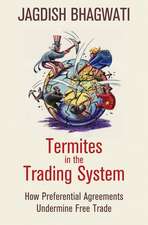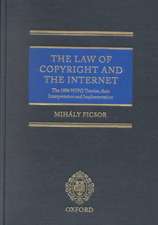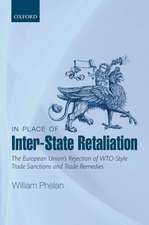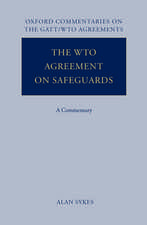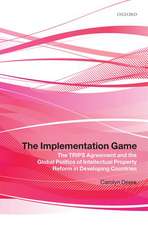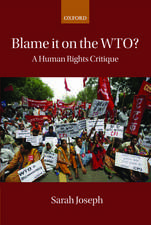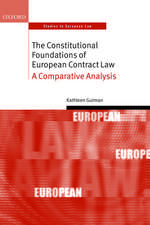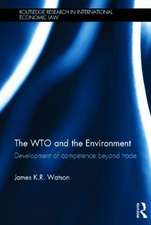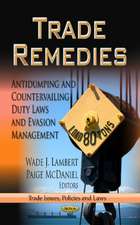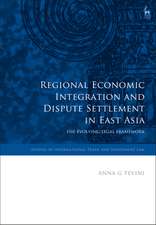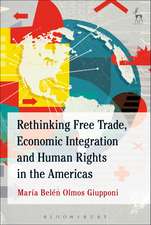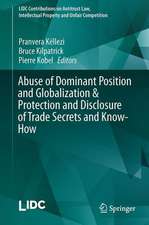International Development Law: Rule of Law, Human Rights & Global Finance
Autor Rumu Sarkaren Limba Engleză Paperback – 27 mar 2021
This book describes how international development works, its shortcomings, its theoretical and practical foundations, along with prescriptions for the future. International Development Law provides the reader with new perspectives on the origins of global poverty, identifies legal impediments to sustainable economic growth, and provides a better understanding of the challenges faced by the international community in resolving global poverty issues.
The text is structured into two basic parts: the first part deals with the theoretical and philosophic foundations of the subject, and the second part sets forth issues relating to the international financial architecture, namely, international borrowing practices, privatization, and emerging economies. In particular, the book provides new, innovative analysis on corruption as an impediment to sustainable development. The three interlocking facets of corruption are examined: transnational organized crime, Islamic-based international terrorism, and corruption within emerging economies and the international banking system. Thus fresh new analysis adds depth and clarity to a field that heretofore has been scattered and superficial. Finally, the “right to development” within the international human rights discourse is critically reviewed, particularly in light of new jurisprudence emerging from the African context.
This book offers a fresh, new and balanced legal perspective on the development process. The text has been rigorously researched and has many practical facets based on the author’s professional experience within the international development field. It is an invaluable research and teaching tool since it takes a multidisciplinary approach to putting complex issues, legal trends and political questions into a clear, new perspective that is highly analytical as well as accessible to the reader. The author's elegant legal prose is both powerful and persuasive.
| Toate formatele și edițiile | Preț | Express |
|---|---|---|
| Paperback (1) | 899.21 lei 6-8 săpt. | |
| Springer International Publishing – 27 mar 2021 | 899.21 lei 6-8 săpt. | |
| Hardback (2) | 721.04 lei 31-38 zile | |
| Oxford University Press – 29 oct 2009 | 721.04 lei 31-38 zile | |
| Springer International Publishing – 27 mar 2020 | 905.54 lei 6-8 săpt. |
Preț: 899.21 lei
Preț vechi: 1096.60 lei
-18% Nou
Puncte Express: 1349
Preț estimativ în valută:
172.06€ • 179.65$ • 142.40£
172.06€ • 179.65$ • 142.40£
Carte tipărită la comandă
Livrare economică 04-18 aprilie
Preluare comenzi: 021 569.72.76
Specificații
ISBN-13: 9783030400736
ISBN-10: 3030400735
Ilustrații: XXXV, 453 p. 2 illus.
Dimensiuni: 155 x 235 mm
Greutate: 0.68 kg
Ediția:2nd ed. 2020
Editura: Springer International Publishing
Colecția Springer
Locul publicării:Cham, Switzerland
ISBN-10: 3030400735
Ilustrații: XXXV, 453 p. 2 illus.
Dimensiuni: 155 x 235 mm
Greutate: 0.68 kg
Ediția:2nd ed. 2020
Editura: Springer International Publishing
Colecția Springer
Locul publicării:Cham, Switzerland
Cuprins
Introduction: Setting the Stage.- Part I.- The Rule of Law.- The Rule of Law: Theoretical Principles.- International Development Law: Substantive Principles.- Is There a Human Right to Development?.- Part II.- International Financial Architecture.- Sovereign Borrowing and Debt: Legal Implications.- Privatization as a Development Strategy.- Emerging Capital Economies.- Corruption and Its Consequences.- Afterthought.
Notă biografică
Dr. Rumu Sarkar serves as General Counsel to Millennium Partners, an international development consulting group based in Charlottesville, VA. Ms. Sarkar was also the former General Counsel for the 2005 Defense Base Closure and Realignment (BRAC) Commission. She also served as the General Counsel for the Overseas Basing Commission, prior to joining the BRAC Commission. Ms. Sarkar was also the former Assistant General Counsel for Administrative Affairs for the Overseas Private Investment Corporation (OPIC), and formerly a staff attorney with the Office of the General Counsel of the U.S. Agency for International Development (USAID). She began her career as a litigation associate with two Wall Street law firms in New York. Ms. Sarkar has also had a distinguished academic career both in teaching and publishing. She is currently a non-resident Assistant Professor at the Uniformed Services University of Health Sciences, located at the Walter ReedNational Military Medical Center in Bethesda, MD. She won a Fulbright Scholarship and lectured at the John Paul II School of Law in Lublin, Poland in 2016. Professor Sarkar was also a Distinguished Guest Lecturer and served on the Advisory Board for Loyola University Chicago School of Law. She was also an Adjunct Law Professor and a Visiting Researcher at the Georgetown University Law Center where she taught several graduate law (LL.M.) seminars. Professor Sarkar has authored three legal texts and many law review articles. Dr. Sarkar completed her undergraduate studies at Barnard College, Columbia University; her law degree from the Antioch School of Law; and her Masters of Law (LL.M.) degree, and her Ph.D. in Philosophy from Newnham College, Cambridge University. She is a member of the NY, DC and U.S. Supreme Court Bars.
Textul de pe ultima copertă
This book describes how international development works, its shortcomings, its theoretical and practical foundations, along with prescriptions for the future. International Development Law provides the reader with new perspectives on the origins of global poverty, identifies legal impediments to sustainable economic growth, and provides a better understanding of the challenges faced by the international community in resolving global poverty issues.
The text is structured into two basic parts: the first part deals with the theoretical and philosophic foundations of the subject, and the second part sets forth issues relating to the international financial architecture, namely, international borrowing practices, privatization, and emerging economies. In particular, the book provides new, innovative analysis on corruption as an impediment to sustainable development. The three interlocking facets of corruption are examined: transnational organized crime, Islamic-based international terrorism, and corruption within emerging economies and the international banking system. Thus fresh new analysis adds depth and clarity to a field that heretofore has been scattered and superficial. Finally, the “right to development” within the international human rights discourse is critically reviewed, particularly in light of new jurisprudence emerging from the African context.
This book offers a fresh, new and balanced legal perspective on the development process. The text has been rigorously researched and has many practical facets based on the author’s professional experience within the international development field. It is an invaluable research and teaching tool since it takes a multidisciplinary approach to putting complex issues, legal trends and political questions into a clear, new perspective that is highly analytical as well as accessible to the reader. The author's elegant legal prose is both powerful and persuasive.
Caracteristici
Provides an in-depth discussion of business and investment trends and practices in emerging economies Written for researchers, practitioners and students Takes a multidisciplinary approach spanning economics, history, political theory and law
Descriere
Descriere de la o altă ediție sau format:
As we move further into the 21st century, it is incumbent upon lawyers and law students to understand and manage the complexities of sustainable development. International Development Law: Rule of Law, Human Rights, and Global Finance offers a coherent and systematic overview of the many issues and underlying trends that affect 'international development law' and the underlying legal architecture between developing countries and advanced nations.Professor Sarkar describes how international development works, its shortcomings, its theoretical and practical foundations, along with the prescriptions for the future. The text is structured into two basic parts: the first part deals with the theoretical and philosophic foundations of the subject, and the second part sets forth issues relating to the international financial architecture, namely, international borrowing practices, privatization, and emerging economies. International Development Law provides the reader with new perspectives on the origins of global poverty, identifies legal impediments to sustainable economic growth, and provides a better understanding of the challenges faced by the international community in resolving global policy issues.
As we move further into the 21st century, it is incumbent upon lawyers and law students to understand and manage the complexities of sustainable development. International Development Law: Rule of Law, Human Rights, and Global Finance offers a coherent and systematic overview of the many issues and underlying trends that affect 'international development law' and the underlying legal architecture between developing countries and advanced nations.Professor Sarkar describes how international development works, its shortcomings, its theoretical and practical foundations, along with the prescriptions for the future. The text is structured into two basic parts: the first part deals with the theoretical and philosophic foundations of the subject, and the second part sets forth issues relating to the international financial architecture, namely, international borrowing practices, privatization, and emerging economies. International Development Law provides the reader with new perspectives on the origins of global poverty, identifies legal impediments to sustainable economic growth, and provides a better understanding of the challenges faced by the international community in resolving global policy issues.
Recenzii
...if you have pretty much any interest in this intersection of topics, or newly emerging international legal field, however you want to put it, I think you will have to take a look at this book.
International Development Law: Rule of Law, Human Rights, and Global Finance provides a tightly interwoven, well-organized, multi-disciplinary approach to the complex legal issues underlying sustainable international development. Professor Sarkar provides an overarching view of the legal principles that constitute international development law in an easily understandable way. This book gives the reader new insights on the origins of global poverty, identifies legal impediments to long-term, sustainable economic growth, and provides a better understanding of the challenges faced by the international community in resolving global poverty issues.
There is a huge amount of historical and philosophical information packed into International Development Law, with smatterings of anthropological and sociological thoughts here and there, that provides a text covering the complex legal & financial issues involved in international development. And Sarkar does it in an easy to read, well-organized manner (the glossary, abbreviations list, and index are nothing to sneeze at either)...I would recommend this book for any academic or firm library, definitely, as an academic treatise as well as a helpful guide for practicing attorneys in international development law.
In this path-breaking work, Professor Rumu Sarkar expertly combines law, philosophy, political theory, and economic analysis with real world experience to establish for the first time a comprehensive foundation of substantive law principles of international development law. This meticulously documented work is sure to be the touchstone for all future writing in a subject area that is quickly emerging as one of the most important in international law.
This book is a valuable contribution to the literarture on a developing area of international law. Sarkar's work is thoughtful and well researched; it largely achieves the goal of bringing cohesion to a largely scattered topic.
Rumu Sarkar's new book comes as a most welcome decisive step forward. Making full use of her acute intelligence and multiple fields of expertise, and writing with the moral passion of one who cares personally for those whom development at its best is meant to benefit, Sarkar works just that synthesis which international development law, as a simultaneously academic and practical discipline fraught with ethical importance, has been so long awaiting.
Rumu Sarkar makes the case for looking at international development law from the prism of mutuality, a duty of cooperation and equitable participation in development. I wholeheartedly recommend this book to readers of international development law, whether they be students or practitioners.
International Development Law: Rule of Law, Human Rights, and Global Finance provides a tightly interwoven, well-organized, multi-disciplinary approach to the complex legal issues underlying sustainable international development. Professor Sarkar provides an overarching view of the legal principles that constitute international development law in an easily understandable way. This book gives the reader new insights on the origins of global poverty, identifies legal impediments to long-term, sustainable economic growth, and provides a better understanding of the challenges faced by the international community in resolving global poverty issues.
There is a huge amount of historical and philosophical information packed into International Development Law, with smatterings of anthropological and sociological thoughts here and there, that provides a text covering the complex legal & financial issues involved in international development. And Sarkar does it in an easy to read, well-organized manner (the glossary, abbreviations list, and index are nothing to sneeze at either)...I would recommend this book for any academic or firm library, definitely, as an academic treatise as well as a helpful guide for practicing attorneys in international development law.
In this path-breaking work, Professor Rumu Sarkar expertly combines law, philosophy, political theory, and economic analysis with real world experience to establish for the first time a comprehensive foundation of substantive law principles of international development law. This meticulously documented work is sure to be the touchstone for all future writing in a subject area that is quickly emerging as one of the most important in international law.
This book is a valuable contribution to the literarture on a developing area of international law. Sarkar's work is thoughtful and well researched; it largely achieves the goal of bringing cohesion to a largely scattered topic.
Rumu Sarkar's new book comes as a most welcome decisive step forward. Making full use of her acute intelligence and multiple fields of expertise, and writing with the moral passion of one who cares personally for those whom development at its best is meant to benefit, Sarkar works just that synthesis which international development law, as a simultaneously academic and practical discipline fraught with ethical importance, has been so long awaiting.
Rumu Sarkar makes the case for looking at international development law from the prism of mutuality, a duty of cooperation and equitable participation in development. I wholeheartedly recommend this book to readers of international development law, whether they be students or practitioners.

